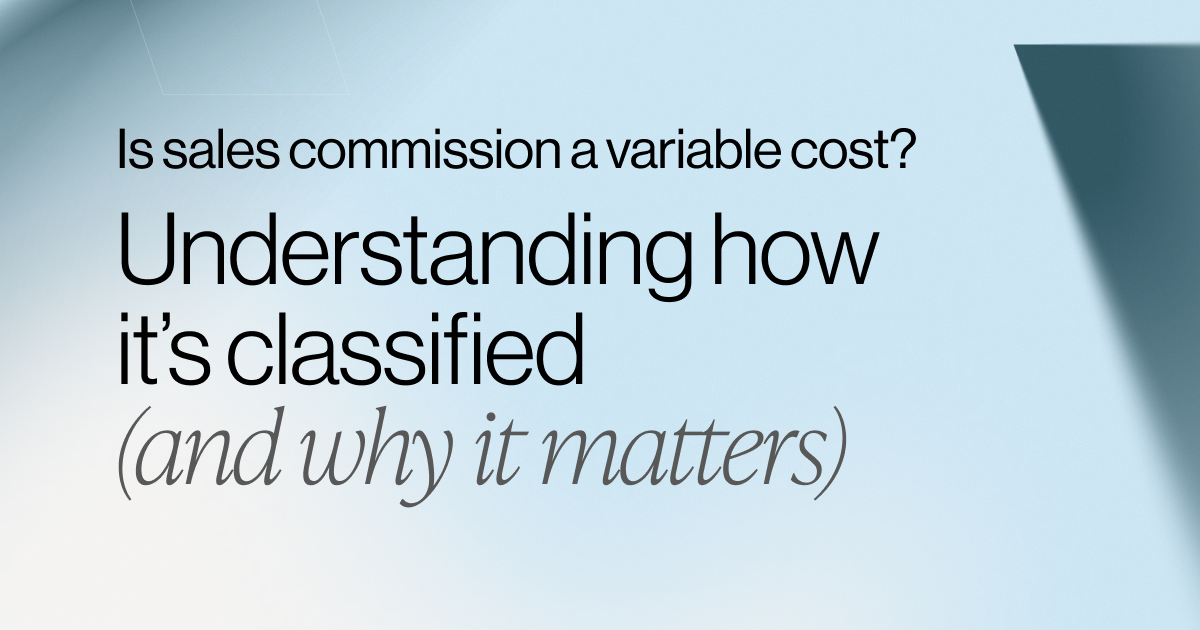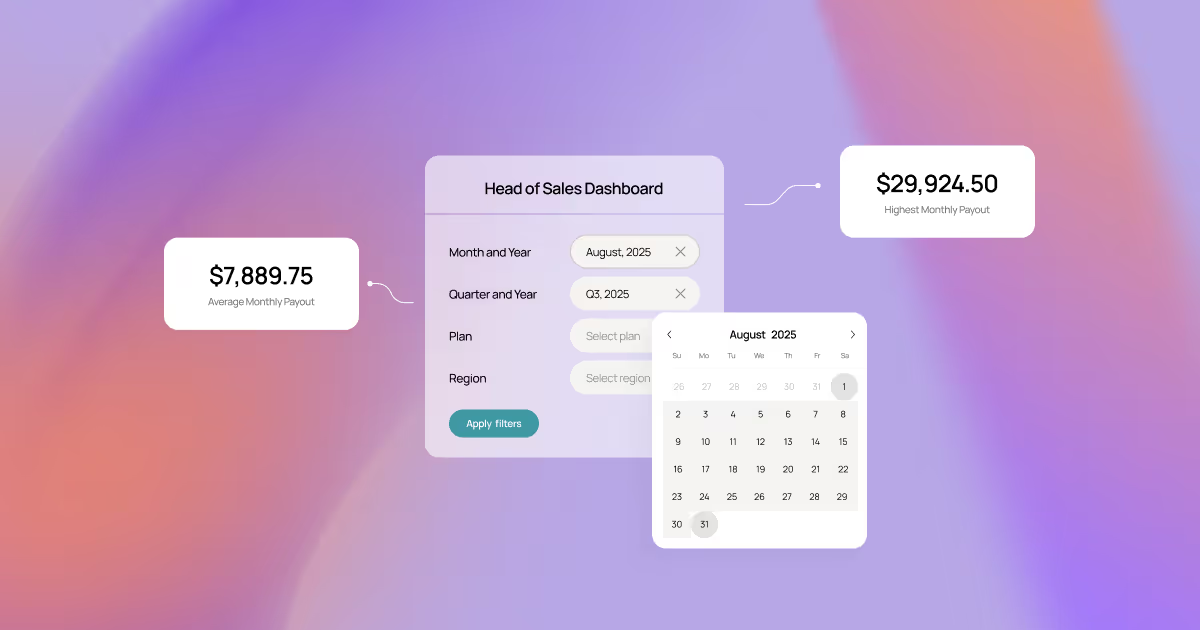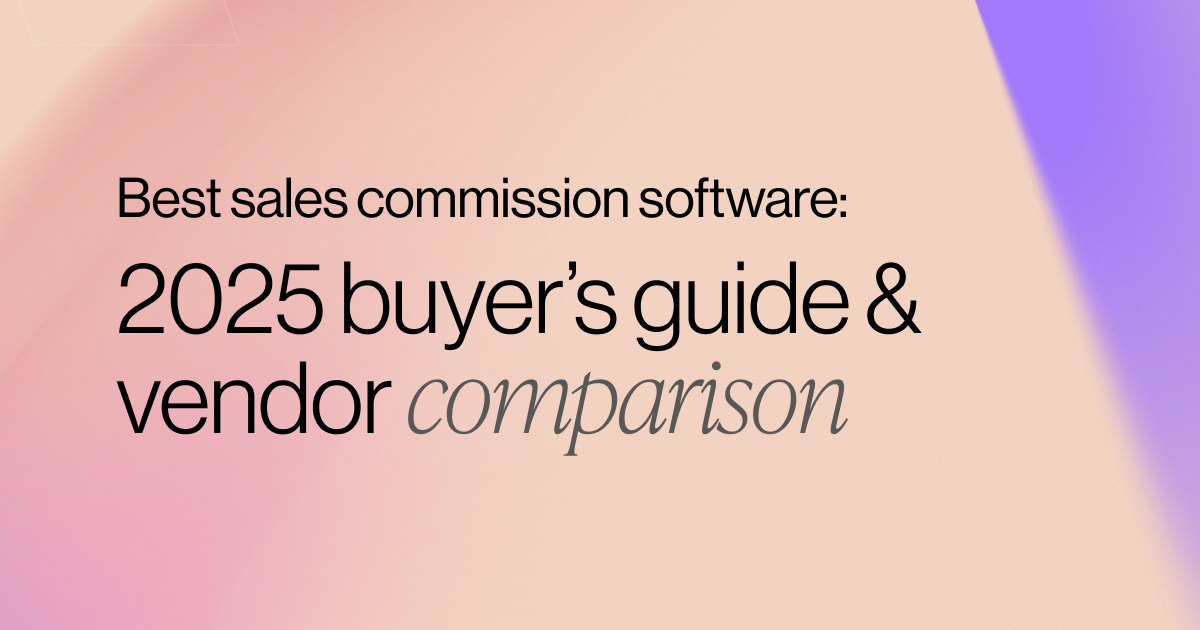Sales Bonus vs. Commission vs. Incentive: What’s the Difference?
Sales compensation sends a message.
It tells your reps what matters, where to focus, and whether it’s worth sticking around. Yet, for something that carries so much weight, too many companies still treat compensation like a math problem: plug in some sales targets, add a payout structure, adjust annually. Done.
But when the structure is wrong, the consequences stack up fast — in rep churn, missed goals, and deals sandbagged or skipped entirely. And nowhere is the structure more misunderstood than in the choice between bonuses and commissions.
More than a terminology difference, this is a question of strategy. One that asks:
Are we rewarding what we can count, or what we actually care about?
We want to cut through the jargon and get to the core differences between bonuses and commissions: when each works, when they don’t, and why more teams are rethinking how they use both.
Because in a market where 59% of companies are leaning on incentive comp to drive growth (according to our 2025 State of ICM report), structure is the name of the game.
What is the Difference Between Bonus and Commission Pay?
A commission is transactional. You close a deal, you get paid. The more you sell, the more you earn. It’s linear, measurable, and tied directly to revenue.
A bonus is conditional. You hit a milestone, exceed a target, or contribute to something bigger than your individual sales quota, and you’re rewarded. Sometimes it’s a fixed dollar amount or a percentage. Sometimes it’s surprise-and-delight (but less delightful when you don’t know the criteria in advance).
The main difference is that commission is directly tied to sales; bonus pay is not. Where commissions say “do more,” bonuses say “do it well.” In other words, while commission plans offer a variable income based on sales activity, bonus plans provide a set payment that reps can receive regardless of sales results (though there may still be a minimum level of sales required for the bonus).
They’re not mutually exclusive. But treating them like interchangeable tools (or slapping on a year-end bonus and calling it motivation) is where many comp strategies lose the plot. Because what you pay for is what people optimize for. And if you’re not clear on the difference, neither are they.
When Should You Use Commission Pay?
Commission-based pay is the go-to for a reason. It creates a direct line between effort and outcome: sell more, earn more. It’s clean, motivational, and easy to explain. And in roles where the rep owns the full sales cycle (prospecting, closing, expanding), it works.
Especially in fast-paced, transactional environments (think SaaS, real estate, insurance), commission becomes more than a pay structure. It’s the system. It governs how reps prioritize their time, how fast they move, and how many deals they chase.
But simplicity isn’t the same as fit. Commission structures work best when:
- You have a clear budget and predictable margins. You know what a rep can earn without throwing off CAC or headcount plans.
- You want high activity and individual ownership. Sellers on commission are motivated to sell as much as possible, so they will naturally try to close deals from higher-level accounts that pay more per sale. These bigger deals will also come with additional prestige and an opportunity for advancement within the organization, a good combination that can lead to results.
- You’re hiring people who’ve done this before. Reps used to variable pay and are well-versed in the art of cold-calling or door-to-door selling know how to hunt. They don’t need hand-holding, they need opportunity.
This structure rewards volume and hustle. It’s designed for speed, and it’s widely used: according to our 2025 State of ICM report, 75% of sales roles are measured against revenue generated, making commission the most common incentive mechanism across teams today.
But that also means it can warp behavior. If every dollar depends on closing, reps may rush deals, ignore upsell potential, or avoid customers who need more education. That’s not a flaw per se, but rather the natural outcome of a system optimized for output.
So if you’re going to use commission, do it intentionally. Build in guardrails, and make sure your plan reflects how your company wants to grow.
When Should You Use Bonus Pay?
Whereas commission is about output, bonuses are about impact. They’re not tied to every transaction. Instead, they reward the outcomes that matter, such as hitting a team target, landing a strategic logo, exceeding quarterly goals, or delivering great customer experience. They give you more control over what gets rewarded and when.
That makes bonus structures especially useful in more complex or collaborative sales environments, where success depends on more than just individual quota attainment. For example, some companies structure bonus pay based on a particular sales bonus percentage. Most sales-based bonus pay ranges from 5% to 30% of total sales revenue.
Bonuses work well when:
- You’re managing long or team-based sales cycles. Think enterprise deals that involve multiple stakeholders and departments, not just a single rep with a monthly close target.
- You want to incentivize behavior that isn’t just about the sale. Cross-functional alignment, customer satisfaction, product adoption…bonuses let you assign value to things that aren’t visible in pipeline reports.
- You’ve moved beyond pure hunting. If your go-to-market motion includes retention, renewals, or expansion, bonus pay can flex with nuance that commission can’t.
Unlike commission, bonuses also offer a psychological advantage because they feel like recognition. That doesn’t mean they’re squishy. You can (and should) build structure into bonus eligibility, but you also have room to calibrate.
One caution: the more ambiguous the criteria, the less effective the bonus. Reps can’t optimize for rewards they don’t understand, so if you’re going to use them, make them clear, timely, and most importantly, make them mean something.
Non-Discretionary vs. Discretionary Bonuses
Not all types of bonuses function the same way.
A non-discretionary bonus is earned. It’s promised upfront and tied to specific performance criteria. Think: “Close $1M in revenue this quarter, and you’ll receive a $10K bonus.” These are easier to track, plan for, and defend in a comp review.
A discretionary bonus is optional. It’s given at the company’s (or manager’s) discretion, often as a spot reward or recognition. Think: “You crushed it on that launch, here’s a $1,000 thank-you.”
There’s a place for both, but discretionary bonuses come with baggage: lack of transparency, unclear expectations, and potential equity issues. Use them sparingly, and never as a substitute for a well-structured plan.
Bonus, Commission, Incentive: What’s the Actual Difference?
If commissions and bonuses are tools, then incentive pay is the category they live under. That’s it.
Maybe you’ve tripped over these terms before or used them interchangeably, which isn't all that uncommon. Still, the distinction matters, especially when you’re designing sales compensation plans, setting expectations, or explaining payouts to a room full of reps who just want to know how they’re getting paid.
Commission is performance-linked, recurring, and tied to closed revenue. Bonus is outcome-based, milestone-driven, and typically awarded in lump sums. Both are a type of incentive.
Incentive pay, then, is the umbrella term that includes both, along with equity, profit-sharing, SPIFFs, and other performance-linked rewards, such as:
- A flexible schedule
- Gifts
- Recognition
- Rewards and referral programs
- Tuition reimbursement
- Mental health and wellness (e.g., gym memberships)
Bonus + Commission: Why Not Both?
Most sales orgs don’t have to choose between commission or bonus. Many use both, but not randomly, and not just to look generous. They do so in order to build a system that rewards the right behavior at the right moment, without sending mixed signals.
Sales commissions keep the engine running. It rewards consistent activity: prospecting, closing, staying aggressive. Bonus pay adds strategic weight. It gives you levers to influence behavior beyond the day-to-day deal cycle.
Used well, bonuses can fill in the gaps that commission misses. They can stretch performance, reward collaboration, and help sales reps focus on what moves the business forward instead of what closes fastest.
And this is where things usually break down.
Because without visibility (without a clear understanding of how commissions are calculated or bonuses are awarded) reps stop trusting the system. Our research revealed that 35% of companies say reps don’t understand how their incentive comp is calculated, leading to payout disputes, lost productivity, and shadow accounting. Plus, only 52% of orgs provide reps with real-time visibility into their earnings, and nearly 80% field more than ten inquiries per pay period about how payouts are calculated.
So if you’re going to mix commission and bonuses, you need structure, transparency, and an incentive plan that doesn’t buckle under complexity. Which brings us to the next section.
Building a Compensation Strategy Anchored in Sales Performance
You can’t build a comp plan until you know what you’re optimizing for. Is it growth at all costs? Predictable margin? Customer retention? Cross-functional alignment?
Each of those demands a different mix of sales incentives, and a different way of measuring success.
So the question isn’t “Should we use bonuses or commissions?” It’s:” What behavior are we trying to drive, and how do we know it’s working?”
A lot of companies don’t have a good answer. Their comp plans are duct-taped together in spreadsheets. Their reps don’t know how their payouts are calculated. And when something changes (headcount, sales goals, market conditions) the entire system collapses under the weight of rework.
That’s where CaptivateIQ fits. Our platform lets you:
- Design comp plans with intention. Model bonuses, commissions, quotas, and ramp scenarios before they ever reach payroll, and see how each one impacts cost, behavior, and revenue.
- Automate the entire payout process. Our SmartGrid™ engine powers accurate, auditable calculations for commissions, bonuses, SPIFFs, and MBOs. No formulas to debug, no spreadsheets to chase.
- Give reps real-time visibility. Reps can see what they’ve earned, what’s still in motion, and what actions will get them closer to goal, all within their own dashboard.
- Adapt your plans without blowing them up. Roll out mid-year changes, test new plan variants, or shift quotas and territories in one system built to flex as fast as your team does.
If compensation is one of your biggest levers for growth, CaptivateIQ gives you the infrastructure to pull it with confidence, clarity, and control.
Book a demo with our team to learn more!
Bonus vs. Commission Frequently Asked Questions
What’s the Difference Between a Bonus and a Commission?
A commission is directly tied to closed revenue, and it’s usually calculated as a percentage of each sale. The more you sell, the more you earn. A bonus, on the other hand, is typically a fixed amount (or a % of total sales) awarded for reaching specific performance milestones or broader goals, such as hitting quarterly targets, improving customer satisfaction, or contributing to a cross-functional win.
Think of it this way: commissions reward activity; bonuses reward outcomes. Both are part of incentive pay, but they serve different purposes.
How Do You Calculate Bonus and Commission?
Commission is typically calculated as a percentage of revenue generated. For example, if a rep earns 10% commission and closes a $50,000 deal, their payout is $5,000. More advanced commission plans might include thresholds, accelerators, or tiered commission rates, all of which adjust the percentage based on performance bands.
Bonuses are often fixed dollar amounts tied to specific goals. For example:
- $5,000 for exceeding quarterly quota
- 10% of salary for hitting annual NRR targets
- $1,000 discretionary bonus for high-impact work
Can You Receive Both a Bonus and a Commission?
Yes, and in many sales orgs, you should. Commission rewards transactional performance: the deals you close, the revenue you bring in. Bonuses are layered on top to recognize broader impact, such as exceeding targets, supporting team goals, or driving strategic outcomes like retention or expansion.
A strong comp strategy uses bonuses and commissions together, backed by a clear structure, real-time visibility, and zero surprises.
What’s the Difference Between Profit Sharing and Commission?
Commission is tied to individual performance. It’s a percentage of revenue earned per deal or target and often paid out frequently (monthly or quarterly).
Profit sharing is tied to the company’s overall financial performance, typically distributed as a percentage of profits at year-end. It’s less about individual output and more about collective success.
In short, commission rewards revenue generation; profit sharing rewards profitability. One drives seller behavior directly, while the other aligns employees to the company’s bottom line.
What is Incentive Pay?
Incentive pay is any form of compensation tied to performance. It sits on top of base salary and includes things like commissions, bonuses, SPIFFs, profit sharing, and equity, all structured to motivate specific outcomes.
How do I Choose the Right Compensation Structure?
Ask what behaviors you’re trying to drive. If your reps own the full sales cycle and success is tied to closed revenue, commission likely makes sense. If results depend on collaboration, long-term customer outcomes, or cross-functional wins, bonuses may be a better fit.
Most orgs use both, layering commission for core selling activity with bonuses for strategic priorities. All in all, your plan should reflect your business goals, your sales motion, and what success actually looks like. And if your strategy changes, your comp structure should be able to change with it.
.svg)








